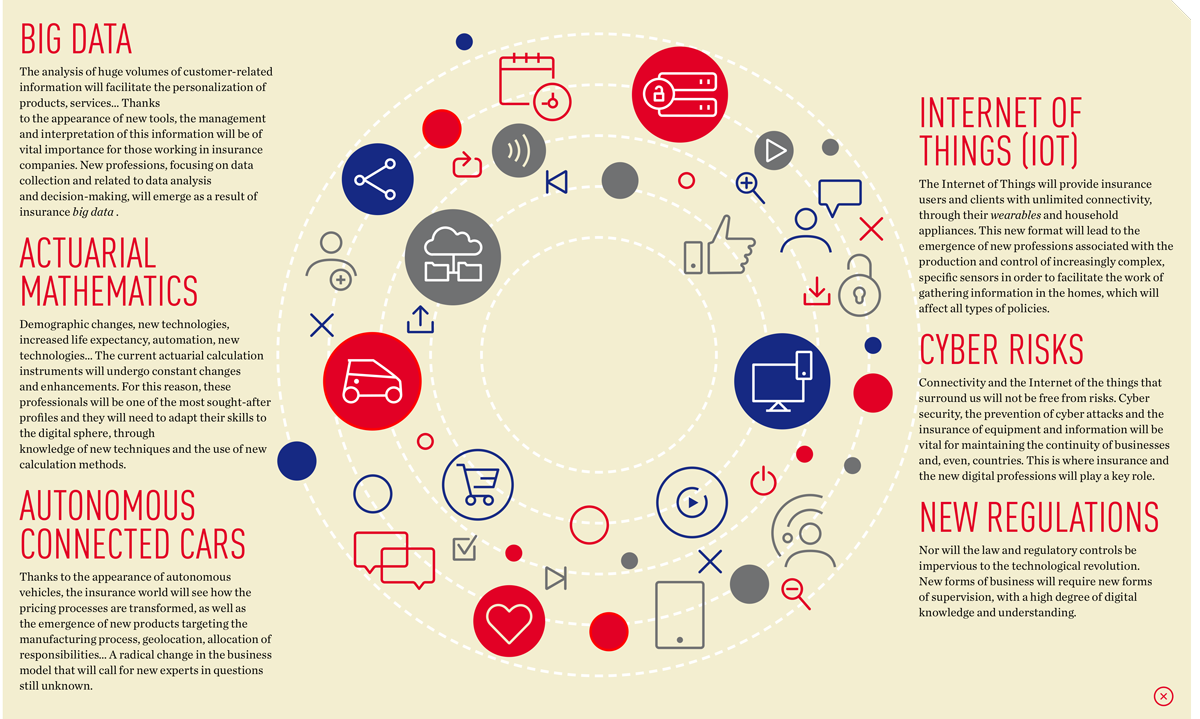The dizzying pace at which technological progress generates new macro trends leaves no one indifferent. Experts in different fields of knowledge agree that we are facing a paradigm shift, which will transform the world in which we live and work. Are we really ready for it?
TEXT: DAVID RUBIO PHOTOS: THINKSTOCK
Various gurus of the future world and trend predictions claim that we are now on the cusp of a fourth industrial revolution, where intelligent systems will form part of our daily lives – in homes, factories, farms and cities – opening the door to new professions related to technological development. All this augurs winds of change in the labor market, producing profound transformations in the professional world which will require the productive workforce to adapt by acquiring new digital skills.
When we speak of digitization, a range of terms spring to mind, such as startup, big data, programming, blockchain, bitcoin, artificial intelligence, automation… These new processes and models for economic and labor organization and distribution arise as a result of globalization, the financial crisis, business decentralization, mobile connectivity, the digital transformation and the collaborative economy. The medium-term outlook predicts that many professions born out of the 20th century globalization process will disappear, making way for different, unprecedented forms of production, where digital employment will be one of the outstanding features. In any case, they will be directly related to the emergence of new elements, such as intelligent learning, 5G networks, nanotechnology or virtual reality.
How will this affect “traditional” employment?
A recent report produced by the World Economic Forum confirms the trend: the digital economy will require millions of technology experts to help bridge the divide that exists between current production systems and the new ways of working. According to data from the report The Future of Jobs: Employment, Skills and Workforce Strategy for the Fourth Industrial Revolution, 65 percent of children starting first grade of elementary education today will end up working in professions that do not yet exist.
In the near future, digital services will play a fundamental role in an increasingly diverse ecosystem, the professional profiles will suffer a polarization as the digitization process advances and – probably – we will observe a clear division between those professionals dedicated to the advancement, application and direct development of technology, and those new profiles – also digital – related to the implementation, management and advancement of digital business models, strategies and markets.
What new skills will digital employment call for?
According to experts in social and business prediction such as Thomas Frey, author of the book Communicating With the Future, the profile of workers in the 21st century will require specific skills, focusing on their ability to optimize already existing processes, constantly adapt to change, reconvert and dismantle old production models without causing problems, and maintain a high degree of customer orientation. Moreover, they will have to be experts in usability and user experience, capable of contextualizing the use of technology in the various social spheres and concerned about the legacy they may leave to future generations. In short, analytical profiles, focused on the sciences, calculation, analysis of huge amounts of data, computing… without forgetting about humanism, ethics or philosophy.
What will digital jobs in the insurance world be like?
The arrival of automation and constant technological change will lead to many professions stemming from insurance activities changing and new opportunities appearing. It would be difficult to get predictions right but, thanks to current advances, we could envisage a scenario in which the industry reinvents itself. Over the next decade, new opportunities will be developed for those wishing to work in the insurance industry. On pages 30 and 31 you can see some of the central issues around which work will revolve.
Despite the debate raging between techno-optimists and techno-pessimists, it is impossible to speculate what the future labor market will be like. Employment, as we have known it to date, changes in a constant cycle. And it is in this process where unprecedented scenarios will arise, full of challenges and opportunities.





